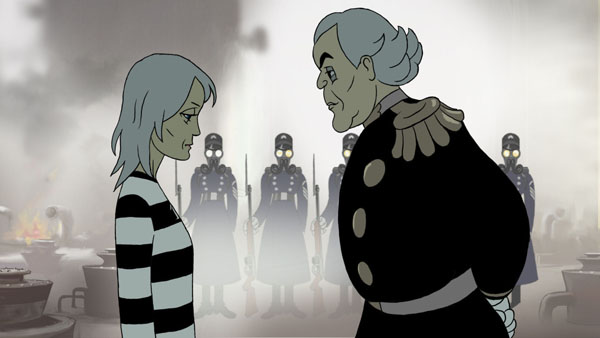“Five years in production and with no less than six countries lending a hand,” begins Dan Fainaru for Screen, “Ari Folman’s ambitious new film will most likely be a much tougher nut to crack than his acclaimed Waltz with Bashir. Again using both animation and live action, it may look for a while as a fierce attack on the Hollywood system but quickly develops into an existential portrait of the future as a hallucinatory, colorful drug-induced heaven—for drugs read anything from religions and fashionable ideologies to show business drivel—into which a vast majority of mankind will retreat to escape the unbearable reality of their lives.”
Robin Wright, playing herself, “accepts a last contract offered by a major film studio which proposes to strip her entirely of her image,” explains Domenico La Porta at Cineuropa. “Robin, whose best years are starting to fade and who is unemployed, is drawn by the offer which consists of scanning her entire body in order to rejuvenate a number of virtual clones who could then be used, sold, and altered infinitely by film producers, perpetuating a fixed image in all the splendor of its youth…. After the prologue, we find the actress, twenty years later, in a dystopian society where people have lost all control and where life is governed and lived thanks to a plethora of drugs. At the age of 63, Robin is invited to a Futurology Congress where the cinematographic-pharmaceutical multinational Paramount Nagasaki presents its latest invention: the possibility of living your own film on demand with the actress of your choice.”
“Based on the 1971 novel The Futurological Congress by the late, prolific Polish sci-fi writer Stanislaw Lem, who also authored Solaris, this is a venturesome and provocative piece with a great deal on its mind,” writes Todd McCarthy in the Hollywood Reporter. “At its most reductive core, it concerns show business and actors and how the shelf-life of performers could, in an insidious but not at all unimaginable way, be made unlimited. Audiences interested in the future of entertainment and Hollywood dwellers above all will find the first 55 minutes, the film’s good part, irresistibly intriguing…. But midway through and with a jump of 20 years, we enter the ‘animation zone’… Within minutes, the air gets sucked out of the film in a palpable way.”
“Evoking Miyazaki and perhaps on-form Gilliam in its best moments, and lurching oddly into Southland Tales territory in its worst, it is a film we’d be happy to call a fascinating muddle, were it not a little overstretched to really support even that summation,” writes Jessica Kiang at the Playlist. “At the very least, however, should your copy of Pink Floyd’s The Wall have worn out through overuse, we can see The Congress having a similar kind of life as a late-night stoner mindfuck.”
“Apart from its general knock against ageism in Hollywood, The Congress doesn’t have much insight to offer on the subject,” adds Variety‘s Peter Debruge. “Meanwhile, somewhere in his adaptation, Folman lost the thread that connects this speculative-fiction allegory to our world. Maybe the film is ahead of its time, though it already feels dated: Such digital scanning of actors is already taking place.” What’s more, “there’s little to connect Wright to this hallucinogenic animated space where disgruntled citizens are free to pass as the persona of their choice, be it Marilyn or Magritte, Grace Jones or Jesus. If this mode of experience were really possible, chances are there would be a lot more Storm Troopers. In fact, the whole place would probably resemble the halls of Comic-Con rather than a scene from Tex Avery’s classic ‘Hollywood Steps Out’ cartoon.”
“Did it take longer than you thought it would?” Anne Thompson asks Folman, who replies, “I think it took, mentally, something like 19 years. So long.” But now the completed film has opened this year’s Directors’ Fortnight.
Updates: The Guardian‘s Xan Brooks: “Folman’s film is a queer fish indeed; the director’s equivalent of that difficult second album. The plot grinds its gears and tries on different hats. At times the metaphysical musings lead it wildly off track and deep into the rough, though there is always enough ambition and eccentricity to keep the journey interesting.”
Guy Lodge at In Contention: “Folman’s chosen animation style—bright, poppy cartoonism that recalls nothing so much as the 1970s work of adult animator Ralph Bakshi, as opposed to the elegant high-contrast futurism of Bashir—has a near-ruinous effect on the film’s already confusing fantasy world. With the design invoking no threat, and the rules of this dayglo ‘zone’ never clearly established (some appear able to drift in and out of it with relative fluency, while others are trapped), the film’s sense of urgency and currency take a considerable hit…. But flashes of fury and beauty remain — and I’m not just talking about the electrifying orchestral score by Max Richter. There’s something exhilarating—mesmerizing, even—about The Congress‘s most ludicrous flourishes.”
Update, 5/17: “Has there ever been a movie so aggressive toward Hollywood power structures?” asks Indiewire‘s Eric Kohn. “From Budd Schulberg’s 1941 novel What Makes Sammy Run? to Robert Altman’s The Player, storytellers have constantly assaulted the studio system, but Folman makes its evils come alive with phantasmagorical effects that force viewers to see the argument from the inside out.”
Update, 5/18: “The ambition of The Congress is such that it almost makes a convincing argument for filmmakers following their mad visions wherever they take them,” writes Tim Grierson for Paste, “even if they haven’t worked out crucial specifics like story and character…. Even when The Congress falters, which is far, far too often, the conviction of [Folman’s] approach keeps convincing you that he’ll pull things together shortly. Too bad that never quite happens.”
You can also watch the post-screening Q&A (11’17”).
Tom Christie for Thompson on Hollywood: “Folman and his production designer David Polonsky had tried to go with the cutout animation that made Waltz with Bashir so memorable but ‘basically it was a nightmare.’ They switched to classical animation, he said, with which they had no experience, and there were problems. ‘The craftsmanship is tough as hell. You have to be either stupid or brave to do it, and probably both.’ It seems Folman and Polonsky were a little of both.”
Update, 5/19: “At its best,” writes Ben Kenigsberg at RogerEbert.com, “it’s lyrical and mysterious, contemplating age-old sci-fi questions (of artificial intelligence, of perception versus reality) while grafting them onto a commentary about the changing nature of movies.” What’s more, it’s “never inaccessible emotionally, or as a commentary on cinema itself.”
Updates, 5/20: “Though it lacks the political bite that made Waltz with Bashir so vital and compelling,” writes Adam Woodward at Little White Lies, “The Congress is a thought-provoking and wildly original meta fantasy that presents a grotesque alternative reality that is essentially an exaggerated projection of modern western society’s obsession with celebrity and immortality. Satirical allusions aside, this won’t be to everyone’s taste—at times Folman lets his imagination run riot and the film veers violently towards Akira levels of what-the-fuck-am-I-watching eccentricity. Still, for as long as Folman holds it together, it’s one hell of a ride.”
“The Congress is a leading candidate for the festival’s craziest film, an unofficial designation won last year by Holy Motors,” writes Jada Yuan for Vulture. “It’s not getting the same raves as Motors… but no one who saw it could refute Wright’s courage in skewering her own career and using the film as a tool to comment on the plight of aging actresses in Hollywood. Folman had developed the movie for years with another actress in mind, but scrapped that when he met Wright at an awards show five years ago and could immediately picture the opening shot, a close-up on her face, streaked with tears, as Keitel enumerates in a magnificent monologue what a failure she is. Folman pitched the idea to her over a cigarette at that award show. ‘He told me the concept, and I was like, “I’m in. Let’s do it. What a cool journey,”‘ said Wright, who also co-produced the film, during a roundtable interview last week.”
Update, 5/22: “Inception is just one of a host of movies The Congress reminded me of,” writes Jordan Hoffman at Film.com. “The full list includes Enter the Void, Antiviral, Synecdoche, New York, Wings of Desire, Children of Men, Holy Motors, and Slaughterhouse-Five. Also, hunting the frame for Easter eggs (is this the first movie to put Ron Jeremy, Muhammad Ali, Rene Magritte and Jesus together?) is like scrutinizing the pages of an Alan Moore comic. These unlicensed, hilarious cameos come when future society is allowed to just be whomever they want to be. Ari Folman, however, is a filmmaker who, almost to a fault is, determined to make movies in his own inimitable way. It may not be for everyone, but his blend of gorgeous fatalism hits the right chord for me.”
Update, 5/23: Anna Tatarska interviews Folman for Slant.
Update, 5/31: At Filmmaker, Ariston Anderson has five questions for Folman and five more for Danny Huston.
Cannes 2013 Index. And you can watch over 100 films that have seen their premieres in Cannes right here on Fandor. For news and tips throughout the day every day, follow @KeyframeDaily on Twitter and/or the RSS feed. Get Keyframe Daily in your inbox by signing in at fandor.com/daily.





